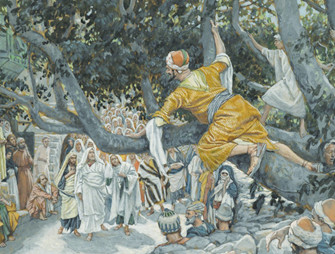There is something of a turn-around in today's Gospel. The standard understanding of Zacchaeus is that he is a notorious tax collector, becoming wealthy by squeezing money out of the people. He is a sinner, a small man, both physically and morally. He learns that Jesus is coming through town, so he climbs a sycamore tree to get a better view of him as he passes by. Zacchaeus doesn’t shout out or call to Jesus, but the Lord sees him and calls him down. Zacchaeus repents and that's the end of his story.
 That’s a good interpretation, but if we listen carefully to the story there's another turn-around, that's quite possible here. One clue is what Zacchaeus has to say. He says,” …if I have extorted any man..." He doesn't say that he has. There is no admission of guilt nor does he strike his breast. He doesn't beg for mercy and doesn't express his sorrow. Furthermore, Jesus makes no reference to repentance and to conversion. And so this might be a clue that maybe something else is going on here.
That’s a good interpretation, but if we listen carefully to the story there's another turn-around, that's quite possible here. One clue is what Zacchaeus has to say. He says,” …if I have extorted any man..." He doesn't say that he has. There is no admission of guilt nor does he strike his breast. He doesn't beg for mercy and doesn't express his sorrow. Furthermore, Jesus makes no reference to repentance and to conversion. And so this might be a clue that maybe something else is going on here.
Maybe Zacchaeus is a good man, and his reputation for being evil is simply pure rumor, backbiting, and lies based on the jealousy of his neighbors. Therefore what Jesus offers is not forgiveness, but rather vindication. What Jesus might be saying is, "you are really not what they say you are. You’re all right in my book. I’ll dine with you." (Jesus seemed to "invite himself over" a lot!)
In other words, what we have here is a Zacchaeus story that can be read about a man who has been misjudged and mistreated by people. To that degree he stands in a long history of those who would be misunderstood and marginalized.
This interpretation opens the story to two vantage points in the narrative. We can be with Zacchaeus "up a tree," or we can be on the ground with those who judge him wrongly. We have all been up that tree at one time or another. On the other hand, there are times we may be on the ground, being the accusers, rash judgers, spreading gossip and delighting in it.
In either case, the Gospel message is there. First it offers complete acceptance by Jesus for those who have been wrongly judged. It reminds us that while people may look at appearances, God reads the heart. Jesus offers vindication and states that if no one else will eat with us, He will. If no one else will make an effort at understanding He will. If no one will take us at our word, He will.
What it comes down to is invitation. It is an invitation to accept the Lord's embrace and to accept his forgiveness. In both cases, the bottom line of the Gospel is "mercy is at work."
The story doesn't tell us what preceded Zacchaeus' going out to see Jesus. We don't know. Was Zacchaeus a man ready for a big change in his life? Maybe, but we aren't explicitly told anything about a prior change of heart or remorse.
Jesus, however, is in a hurry to reach out to Zacchaeus, there is no time to waste. "Today," Jesus says, "I must stay at your house." But who's the host and who's the guest in today's story? While it might be Zacchaeus' house, it is Jesus who does the inviting. He invites Zacchaeus to join him as a guest in Zacchaeus' own house!
Unless we know our own condition and unless we accept the fact that we are lost in ourselves, we will not be able to accept the Lord’s invitation. Neither will we be able to own up to the fact that we need him. We would be like Zacchaeus before his encounter with Jesus. We may be curious about Jesus from all the things we might have heard about him but we won’t do very much about it.




